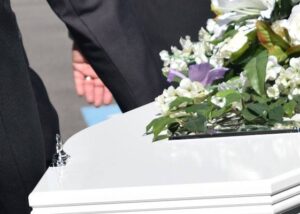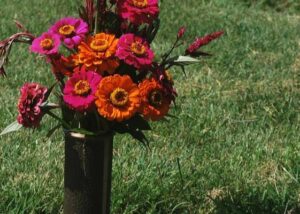What is the Dua for the deceased in Janazah?
Quran
Hadith
Islamic Text
Several Duas for the deceased in Janazah have been narrated. The Dua below is one of the shorter ones and is fairly easy to memorise for Janazah.
اللهُمَّ اغْفِرْ لِحَيِّنَا وَمَيِّتِنَا، وَشَاهِدِنَا وَغَائِبِنَا، وَصَغِيرِنَا وَكَبِيرِنَا، وَذَكَرِنَا وَأُنْثَانَا مَنْ أَحْيَيْتَهُ مِنَّا فَأَحْيِهِ عَلَى الْإِسْلَامِ، وَمَنْ تَوَفَّيْتَهُ مِنَّا فَتَوَفَّهُ عَلَى الْإِيمَانِ
O Allah, forgive our living and our dead, our present and our absent, our young and our old, our male and our female. Whosoever of us You keep alive, keep him alive upon Islam, and whosoever of us You cause to die, let him die upon Iman.
The Dua above is taken from a sound narration in Musnad Ahmad.
عَبْدُ اللهِ بْنُ أَبِي قَتَادَةَ، عَنْ أَبِيهِ، أَنَّهُ: شَهِدَ النَّبِيَّ صَلَّى اللهُ عَلَيْهِ وَسَلَّمَ صَلَّى عَلَى مَيِّتٍ فَسَمِعَهُ يَقُولُ: ” اللهُمَّ اغْفِرْ لِحَيِّنَا وَمَيِّتِنَا، وَشَاهِدِنَا وَغَائِبِنَا، وَصَغِيرِنَا وَكَبِيرِنَا، وَذَكَرِنَا وَأُنْثَانَا “ قَالَ: وَحَدَّثَنِي أَبُو سَلَمَةَ بْنُ عَبْدِ الرَّحْمَنِ بِهَؤُلَاءِ الثَّمَانِ كَلِمَاتٍ، وَزَادَ كَلِمَتَيْنِ: ” مَنْ أَحْيَيْتَهُ مِنَّا فَأَحْيِهِ عَلَى الْإِسْلَامِ، وَمَنْ تَوَفَّيْتَهُ مِنَّا فَتَوَفَّهُ عَلَى الْإِيمَانِ “
Abdullah bin Abi Qatadah narrated from his father (May Allah Most High be pleased with him), that he witnessed the Prophet (peace be upon him) near a deceased individual making the following supplication. O Allah, forgive our living and our dead, our present and our absent, our young and our old, our male and our female. Abu Salamah bin Abd al-Rahman added, Whosoever of us You keep alive, keep him alive upon Islam, and whosoever of us You cause to die, let him die upon Iman. (Musnad Ahmad, 22619).
This Hadith is sound according to Imam al-Haythami.
رَوَاهُ أَحْمَدُ، وَرِجَالُهُ رِجَالُ الصَّحِيحِ
It was narrated by Ahmad, and the narrators are the narrators of the Sahih. (Imam al-Haythami, Majma al-Zawaid).
The narration above is narrated with greater clarity in Sunan Ibn Maja. However, it is a weak narration, so preference is given to the narration in Ahmad. Nevertheless, it supports the narration above.
عَنْ أَبِي هُرَيْرَةَ، قَالَ: كَانَ رَسُولُ اللَّهِ صَلَّى اللهُ عَلَيْهِ وَسَلَّمَ إِذَا صَلَّى عَلَى جِنَازَةٍ يَقُولُ: «اللَّهُمَّ اغْفِرْ لِحَيِّنَا وَمَيِّتِنَا، وَشَاهِدِنَا وَغَائِبِنَا، وَصَغِيرِنَا وَكَبِيرِنَا، وَذَكَرِنَا وَأُنْثَانَا، اللَّهُمَّ مَنْ أَحْيَيْتَهُ مِنَّا فَأَحْيِهِ عَلَى الْإِسْلَامِ، وَمَنْ تَوَفَّيْتَهُ مِنَّا فَتَوَفَّهُ عَلَى الْإِيمَانِ، اللَّهُمَّ لَا تَحْرِمْنَا أَجْرَهُ، وَلَا تُضِلَّنَا بَعْدَهُ
(Sayidina) Abu Hurairah (May Allah Most High be pleased with him) said, when the Messenger of Allah ﷺ offered the funeral prayer he would say, ‘O Allah, forgive our living and our dead, our present and our absent, our young and our old, our male and our female. O Allah, whosoever of us You keep alive, keep him alive upon Islam, and whosoever of us You cause to die, let him die upon Iman. O Allah, do not deprive us of reward (for being patient) and do not allow us to go astray after him.’ (Sunan Ibn Maja 1498, Weak).
And Allah Most High Knows Best.
– Answered by Shaykh Noorud-deen Rashid (11.01.2022)
See also:
Recite Surah Yaseen when visiting a grave?
What do the different Hadith classification terms mean?
See also (video):






